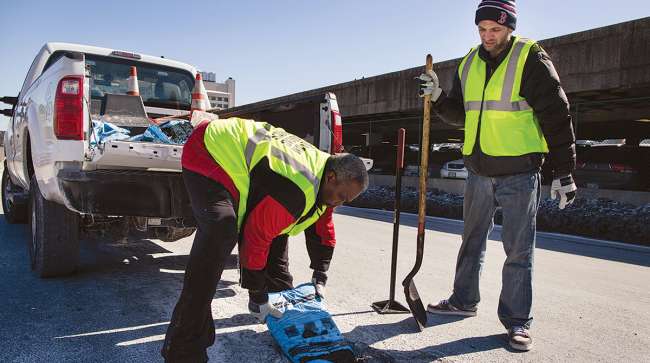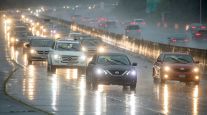Massachusetts Transportation Funding Plan Would Increase Gas Taxes

[Stay on top of transportation news: Get TTNews in your inbox.]
BOSTON — Fees for ride-hailing services and a 5-cents-per-gallon hike in the state’s gas tax are the heart of a plan floated by Democrats in the House of Representatives to pay for upgrades to roads, bridges and public transit.
House Speaker Robert DeLeo said the proposal, which will be taken up by the House next week, is needed to keep the state’s transportation system in good repair.
“The transportation system needs investment,” the Winthrop Democrat told reporters Feb. 26. “When it comes to our transportation system, revenue can’t wait.”
The plan also calls for tacking on a 4-cent increase to the existing 24-cents-per-gallon diesel tax and eliminating a sales tax exemption for the purchase of vehicles by rental car companies. It also would increase the state’s corporate minimum tax to fund transportation projects.
Fees on ride-hailing services such as Uber and Lyft would increase from 20 cents per ride to $1.20 per ride, under the plan.

Baker
House leaders say the transportation funding plan could raise $612 million a year.
DeLeo’s plan is the latest transportation funding proposal to emerge from Beacon Hill. State leaders are hunting for new sources of revenue to fix crumbling roads and bridges, which a recent report suggests have reached a “tipping point,” and to pay for much-needed investments in the MBTA’s system of buses, trains and subways cars.
On Feb. 25, the House Committee on Bonding, Capital Expenditures and State Assets advanced a proposal by Gov. Charlie Baker that would authorize the state to borrow up to $18 billion over the next five years to spend on public transit upgrades and other transportation-related projects.
Baker’s plan still must be approved by the House and Senate.
Urgent Needs
Baker opposes hiking the gas tax, but is one of a dozen Northeast and Mid-Atlantic governors working on a regional initiative to reduce greenhouse gas emissions from the transportation sector. The so-called Transportation Climate Initiative could lead to more revenue but also higher gas prices from a proposed cap on vehicle emissions.
Baker also supports increased fees on ride-hailing services, which he says lag other states. In his annual address to lawmakers last month, he called for a fivefold increase in the state’s surcharge on ride-hailing companies from 20 cents per trip to $1.
He said the fee hike could generate an additional $73 million a year.
A report rolled out by the Baker administration in August suggested the state has reached a “tipping point” on transportation needs. It recommended more investment, easing traffic bottlenecks, adding toll lanes to existing roads, building affordable housing closer to public transit, and working with businesses on new commuting routes.
Transit advocates gathered in the Statehouse on Feb. 25 calling on lawmakers to move quickly on several transportation initiatives, including proposals to hike the gas tax, hike fares on ride-hailing services, allow congestion toll pricing on state highways and give cities and towns permission to pass regional transportation funding initiatives.
Conservative groups say increasing the gas tax would hurt the state’s economy and commuters, who will have to dig deeper into their pockets to fill up at the pumps.
The 24-cent gas tax hasn’t been increased since 2013, when the levy went up by 3 cents.
The tax generated nearly $800 million in 2019, according to the Department of Revenue. The money goes toward fixing roads and bridges, and other projects.
Compare each of the presidential candidates' plans for addressing America's infrastructure needs. See our Candidate Infrastructure Tracker.
The conservative Massachusetts Fiscal Alliance said DeLeo’s plan to hike fuel and other transportation taxes means fewer people will be able to afford living in the Bay State.
“These measures make it harder for people to make their home here and do business in the state and will only hurt the middle class — especially workers who have to drive,” Paul Craney, the group’s spokesman, said in a statement. “Regressive tax schemes should always be avoided.”
Tax Totals
The 2013 increase was the first since 1991. The Legislature at the time indexed the tax to inflation, so that when the value of the dollar rises, the tax increases along with it.
Groups opposed to the move put a “tank the tax” question on the 2014 ballot to decouple it from inflation. The measure passed with support from 53% of voters.
Massachusetts also charges a 2.54 cent per gallon fee for removing underground gasoline tanks, which brings the state’s overall tax to 26.54 cents per gallon.
Overall, Bay State drivers pay a total of 44.9 cents per gallon in gasoline taxes, including state and federal taxes and other fees, according to the American Petroleum Institute. That puts it below the U.S. average of just under 49.3 cents per gallon, the group says.
In New Hampshire, which has a 22.2-cent state tax, drivers pay 42.23 cents per gallon in total taxes and fees, according to API. In Maine, the total is 48.41 cents.
The Massachusetts Budget and Policy Center, a left-leaning think tank, wants lawmakers to raise taxes on corporations and top earners to pay for transportation upgrades.
“Regressive taxes, like the gas tax, fall heaviest on low-income families,” Marie-France Rivera, the group’s president, said in a statement. “In a state with one of the highest levels of income inequality in the nation, it’s critical that these new investments are made by people and corporations who can most afford it.”
Want more news? Listen to today's daily briefing:
Distributed by Tribune Content Agency, LLC



